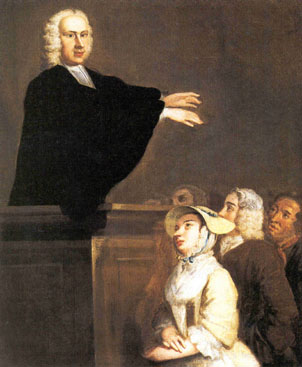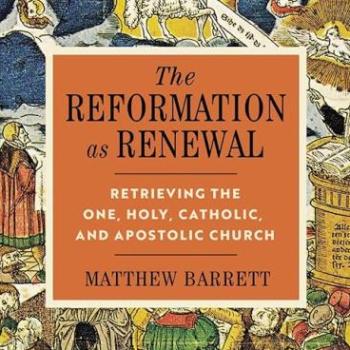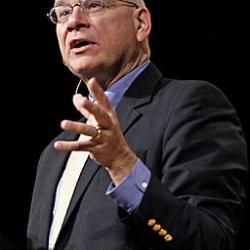Over at the Old Life website, our friend D.G. Hart has a piece, “Between Whitefield and the Vatican,” which argues that George Whitefield (the greatest evangelist of the eighteenth century, and the subject of my current book project) focused too much on the Spirit and personal experience, while Roman Catholics focus too much on the institutional church. Confessional Protestants (like Hart) represent the best balance of Word and Spirit, ordinances and godliness, Hart contends.
It is nothing new for Hart to assign ills to the modern evangelical movement, which Whitefield substantially pioneered. But as I have written before, I don’t think Hart is representing the actual Whitefield, who was as much a theological conservative as a pragmatic innovator, and who actually attained much of the kind of Reformed balance that Hart says he admires.
To be fair, Hart does not engage in an extended treatment of Whitefield, but examines just one of Whitefield’s sermons, “The Kingdom of God” (originally delivered in Glasgow, 1741). 
Hart quotes Whitefield on what he regards as particularly problematic points:
“The kingdom of God, or true and undefiled religion, does not consist in being of this or that particular sect or communion.
. . . neither does [the kingdom of God] consist in being baptized when you were young. . .
. . . neither does it consist in being orthodox in our notions, or being able to talk fluently of the doctrines of the Gospel.”
Hart concludes that “Whitefield is arguably one of the biggest problems facing confessional Protestants because his effort to do justice to the Spirit winds up doing an injustice to the Word and the ordinances the Bible prescribes.”
But Whitefield’s sermon went on to affirm the great value in being part of a truly Reformed church (such as that of the Scottish Presbyterians to whom he was speaking), to insist that baptism was obligatory, and to caution that Reformed doctrine, as explicated by the Westminster Confession, was essential to proper understanding of the gospel. And yet, having all these still did not mean that a person had true faith. Quoting Romans 14: 17, Whitefield preached that true religion consisted of “righteousness, and peace, and joy in the Holy Ghost.” These gave evidence of a saving work of God’s grace in the hearts of regenerate sinners. How, I wonder, does this teaching do “injustice to the Word”? Or, as Hart says later, how does this entail “appealing to the Spirit (without the Word)”?
Whitefield was not perfect, and as he admitted, he indulged some youthful theological excesses (giving undue weight to spiritual impressions, for example). These fostered antinomian tendencies among certain followers, especially in America. But all in all, Whitefield advocated a balanced, vital piety within the safeguarding frameworks of church, doctrine, and sacraments.












